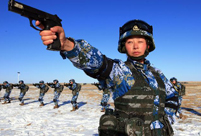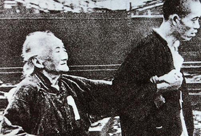 Martenitsa adds glamour to Bulgarian Embassy
Martenitsa adds glamour to Bulgarian Embassy
 Mysterious 'Dolan Tribe' in Xinjiang
Mysterious 'Dolan Tribe' in Xinjiang
 This is Shanghai
This is Shanghai
 Female attendants serving 'two sessions'
Female attendants serving 'two sessions'
 The many tears of DiCaprio
The many tears of DiCaprio
 Dan Dan's bittersweet opera life
Dan Dan's bittersweet opera life
 A dream wedding for a girl suffering from cancer
A dream wedding for a girl suffering from cancer
 Old photos of Anti-Japanese War (1937-1945)
Old photos of Anti-Japanese War (1937-1945)
 This is Beijing – Nanluoguxiang
This is Beijing – Nanluoguxiang
HANGZHOU, March 8 -- China, the largest supplier of American flags, is unlikely to suffer heavy losses from a new ban on made-in-China flags in U.S. military installations, Chinese manufacturers and industry observers have said.
"We have been actively expanding the domestic market for our products," said Huang Baolian, manager of a craftwork company in Yiwu, the eastern Chinese city famous for its commodities market. "Besides, we also produce flags for a lot more countries."
Statistics accessed from the United States Census Bureau website show that in 2012 the value of U.S. imports of American flags stood at 3.8 million U.S. dollars, the vast majority of which, or 3.6 million, was for flags made in China.
However, under the requirements introduced in late February, only the Defense Department is restricted to purchasing American flags made entirely in the United States, while federal agencies will continue to fly made-in-China ones.
The new law is regarded as a supplement to the 1941 Berry Amendment that bans U.S. bases from buying food, clothing, military uniforms, fabrics, stainless steel and tools that are not produced in the United States.
The demand for U.S. flags spiked in 2001 after the Sept. 11 terrorist attacks in New York but U.S. manufacturers could not keep up.
The value of national flag imports was only 747,800 U.S. dollars in 2000, but the figure jumped to a shocking 51.7 million in 2001, with China contributing 29.7 million dollars' worth of flags.
Chinese exporters, with their cheap labor and material costs, seized the opportunity, increasing production of American flags and successfully tapping into the American market.
However, faced with surging costs and the changing foreign trade environment, companies in Yiwu City are actively developing new products and soliciting customers in fresh markets.
"In Yiwu, there are almost no companies that only focus on producing national flags," said Huang, whose factory also makes various stationeries.
Chu Yin, a professor at the University of International Relations, labeled the U.S. ban "a typical public relations maneuver" and "symbolic patriotic marketing" that will have little practical effect on international trade. "Flag purchase accounts for only a small part of the overall military procurement," Chu said.
But the academic and other experts agree that Chinese exporters are facing challenges in an increasingly complicated and globalized world.
Jin Canrong, vice president of the School of International Studies of the Renmin University of China, suggested Chinese companies should always be prepared in case of abrupt policy adjustments in other countries.
"Measures like increasing direct investment, promoting cooperation between state-owned and private companies, organizing a legal team specializing in international trade and speeding up the construction of free trade zones can help to soothe the pain of unexpected external changes," Jin said.
 Chaihe village, pure and peaceful fairyland in snow
Chaihe village, pure and peaceful fairyland in snow Belgians warmly welcome arrival of China's giant pandas
Belgians warmly welcome arrival of China's giant pandas Female marines receive tactical training in NW China
Female marines receive tactical training in NW China Blood memory: Nanjing Massacre in 1937
Blood memory: Nanjing Massacre in 1937 Top 10 pure beauties in showbiz
Top 10 pure beauties in showbiz British WWII veteran: I can't forgive Japan
British WWII veteran: I can't forgive Japan Tongban's dream of prosperity
Tongban's dream of prosperity Chinese frigate Yancheng holds drills in Mediterranean Sea
Chinese frigate Yancheng holds drills in Mediterranean Sea A visit to comfort woman's home in South Korea
A visit to comfort woman's home in South Korea Fairyland? Qingdao in sea of clouds
Fairyland? Qingdao in sea of clouds Top 10 most handsome faces in Asia in 2013
Top 10 most handsome faces in Asia in 2013 Female celebs with beautiful long legs
Female celebs with beautiful long legs Cat 'guardians' in Forbidden City
Cat 'guardians' in Forbidden City Large numbers of ancient coins excavated in Inner Mongolia
Large numbers of ancient coins excavated in Inner Mongolia Leisurely life beneath Zhonggulou, where time travels slower
Leisurely life beneath Zhonggulou, where time travels slowerDay|Week|Month